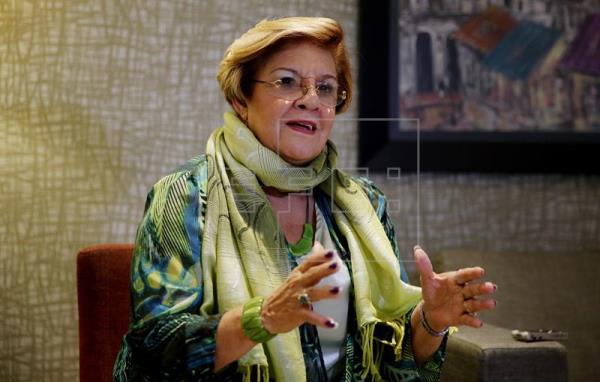BOGOTÁ — In the Americas there is a “worrisome” movement against principles of human rights that has led to a “setback” in several aspects, warned the president of the Inter-American Commission on Human Rights, Esmeralda Arosemena de Troitiño.
These processes go against the “progressivity in the development of human rights” assumed by the American countries and indicates that “once the satisfaction of rights is achieved”, these should be consolidated and not lost, assured the president of the IACHR in an interview with Efe news agency in Bogotá, where she is participating in a seminar on children’s rights.
“There was significant progress in the region in terms of non-discrimination, inclusion, recognition of human solidarity for groups that have historically been excluded and discriminated against,” said Arosemena, adding that, however, now “there is a concern (in the IACHR) and the call we make to the countries is to meet these obligations.”
Among the issues that most concern her, is that violence against women, “because of their status as women,” has advanced in some countries, as well as attacks against the LGBT community.
On violence against women, she considered that “there must be a justice system that guarantees their protection”, as well as “a public policy that establishes precisely” the responsibilities of the States in this regard.
Arosemena de Troitiño explained that violence also affects minors, especially girls who are victims of sexual abuse or who do not benefit from the right to education.
About the LGBT collectives, she considered that they are “really being discriminated against with expressions of violence and hate speech that what they are reflecting is the non-recognition of the dignity of the human being”.
“For the Commission, the key to the validity of human rights is that we recognize that all people, without any exclusion, have dignity that must be respected, recognized and protected,” she stressed.
In this sense, she explained that he does not believe “that there is any society that does not believe in this concept of being human, of what we are as human beings and what we have to do so that we all have the opportunity to live with dignity.”
“The result is that there is a setback then in the recognition of rights,” she said.
Among the countries that most concern the IACHR are Venezuela and Nicaragua, on which it has focused a large part of recent actions.
About the oil country, Arosemena de Troitiño explained that she wants to go to do in the field an evaluation “from the perspective of human rights” and not a “political evaluation”.
With respect to Nicaragua, she reiterated her offer to the Government of Daniel Ortega to “assist in this process of approaching positions.”
But the work of the IACHR goes much further and, in the case of Colombia, works to identify where the risk factors that threaten social leaders and human rights defenders are.
The objective is to evaluate it later and protect the leaders.
Approximately 500 social leaders have been assassinated since November 2016, when the peace agreement between the Government and the FARC guerrilla was signed, according to figures handled by Colombian human rights groups.
The president of the IACHR explained that they also maintain constant monitoring with the two largest countries in the region, Mexico and Brazil, where recently were inaugurated as president, Andrés Manuel López Obrador and Jair Bolsonaro, respectively.
With regard to Mexico, she stressed that “it is important that the government in this development of its action plan” has “an institutional framework that guarantees a public policy projected in the terms” that it has planned.
However, she recalled that “it is a government that is starting and we must give a little time for the development of some things,” although she stressed that “there will always be a need for citizens” to pressure López Obrador to comply with the principles of defense of human rights.
Regarding Brazil, she expressed concern that in the brief period since Bolsonaro took office on January 1, “there have been expressions on the part of the Government in which this position has been marked by groups that do not favor the democratic coexistence”.
Among these positions is the commemoration of the coup of 1964 initially proposed by the president, who denies that there has been a military dictatorship in the country.
Given the situation in the continent, the president of the IACHR said “that humanity has a diversity in its composition” that shows that “we are not equal in the concept”, although it is necessary to work for equality.”
TEXT: Efe news agency












